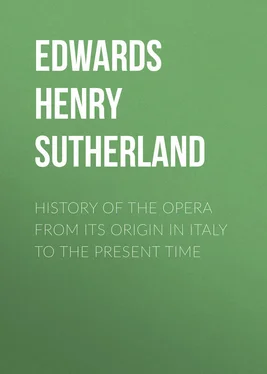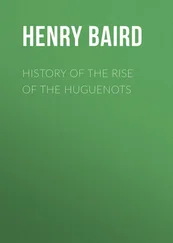Henry Edwards - History of the Opera from its Origin in Italy to the present Time
Здесь есть возможность читать онлайн «Henry Edwards - History of the Opera from its Origin in Italy to the present Time» — ознакомительный отрывок электронной книги совершенно бесплатно, а после прочтения отрывка купить полную версию. В некоторых случаях можно слушать аудио, скачать через торрент в формате fb2 и присутствует краткое содержание. Жанр: foreign_home, music_dancing, foreign_antique, foreign_prose, на английском языке. Описание произведения, (предисловие) а так же отзывы посетителей доступны на портале библиотеки ЛибКат.
- Название:History of the Opera from its Origin in Italy to the present Time
- Автор:
- Жанр:
- Год:неизвестен
- ISBN:нет данных
- Рейтинг книги:4 / 5. Голосов: 1
-
Избранное:Добавить в избранное
- Отзывы:
-
Ваша оценка:
- 80
- 1
- 2
- 3
- 4
- 5
History of the Opera from its Origin in Italy to the present Time: краткое содержание, описание и аннотация
Предлагаем к чтению аннотацию, описание, краткое содержание или предисловие (зависит от того, что написал сам автор книги «History of the Opera from its Origin in Italy to the present Time»). Если вы не нашли необходимую информацию о книге — напишите в комментариях, мы постараемся отыскать её.
History of the Opera from its Origin in Italy to the present Time — читать онлайн ознакомительный отрывок
Ниже представлен текст книги, разбитый по страницам. Система сохранения места последней прочитанной страницы, позволяет с удобством читать онлайн бесплатно книгу «History of the Opera from its Origin in Italy to the present Time», без необходимости каждый раз заново искать на чём Вы остановились. Поставьте закладку, и сможете в любой момент перейти на страницу, на которой закончили чтение.
Интервал:
Закладка:
IN a general view of the history of the Opera, the central figures would be Gluck and Mozart. Before Gluck's time the operatic art was in its infancy, and since the death of Mozart, no operas have been produced equal to that composer's masterpieces. Mozart must have commenced his Idomeneo , the first of his celebrated works, the very year that Gluck retired to Vienna, after giving to the Parisians his Iphigénie en Tauride ; but, though contemporaries in the strict sense of the word, Gluck and Mozart can scarcely be looked upon as belonging to the same musical epoch. The compositions of the former, however immortal, have at least an antique cast. Those of the latter have quite a modern air; and it must appear to the audiences of the present day that far more than twenty-three years separate Orfeo from Don Giovanni , though that is the precise interval which elapsed between the production of the opera by which Gluck, and of the one by which Mozart, is best known in this country. Gluck, after a century and a half of opera, so far surpassed all his predecessors that no work by a composer anterior to him is ever performed. Lulli wrote an Armide , which was followed by Rameau's Armide , which was followed by Gluck's Armide ; and Monteverde wrote an Orfeo a hundred and fifty years before Gluck produced the Orfeo which was played only the other night at the Royal Italian Opera. The Orfeo , then, of our existing operatic repertory takes us back through its subject to the earliest of regular Italian operas, and similarly Gluck, through his Armide appears as the successor of Rameau, who was the successor of Lulli, who usually passes for the founder of the Opera in France, a country where it is particularly interesting to trace the progress of that entertainment, inasmuch as it can be observed at one establishment, which has existed continuously for two hundred years, and which, under the title of Académie Royale, Académie Nationale, and Académie Impériale (it has now gone by each of those names twice), has witnessed the production of more operatic masterpieces than any other theatre in any city in the world. To convince the reader of the truth of this latter assertion I need only remind him of the works produced at the Académie Royale by Gluck and Piccinni immediately before the Revolution; and of the Masaniello of Auber, the William Tell of Rossini, and the Robert the Devil of Meyerbeer, – all written for the said Académie within sixteen years of the termination of the Napoleonic wars. Neither Naples, nor Milan, nor Prague, nor Vienna, nor Munich, nor Dresden, nor Berlin, has individually seen the birth of so many great operatic works by different masters, though, of course, if judged by the number of great composers to whom they have given birth, both Germany and Italy must be ranked infinitely higher than France. Indeed, if we compare France with our own country, we find, it is true, that an opera in the national language was established there earlier than here, though in the first instance only as a private entertainment; but, on the other hand, the French, until Gluck's time, had never any composers, native or adopted, at all comparable to our Purcell, who produced his King Arthur as far back as 1691.
Lulli is generally said to have introduced Opera into France, and, indeed, is represented in a picture, well known to Parisian opera-goers, receiving a privilege from the hands of Louis XIV. as a reward and encouragement for his services in that respect. This privilege, however, was neither deserved nor obtained in the manner supposed. Cardinal Mazarin introduced Italian Opera into Paris in 1645, when Lulli was only twelve years of age; and the first French Opera, entitled Akébar, Roi de Mogol, words and music by the Abbé Mailly, was brought out the year following in the Episcopal Palace of Carpentras, under the direction of Cardinal Bichi, Urban the Eighth's legate. Clement VII. had already appeared as a librettist, and it has been said that Urban VIII. himself recommended the importation of the Opera into France; so that the real father of the lyric stage in that country was certainly not a scullion, and may have been a Pope.
The second French Opera was La Pastorale en musique , words by Perrin, music by Cambert, which was privately represented at Issy; and the third Pomone , also by Perrin and Cambert, which was publicly performed in Paris in 1671 – the year in which was produced, at the same theatre, Psyché , a tragédie-ballet , by the two greatest dramatic poets France has ever produced, Molière and Corneille. Pomone was the first French Opera heard by the Parisian public, and it was to the Abbé Perrin, its author, and not to Lulli, that the patent of the Royal Academy of Music was granted. A privilege for establishing an Academy of Music had been conceded a hundred years before by Charles IX. to Antoine de Baif, – the word " Académie " being used as an equivalent for " Accademia ," the Italian for concert. Perrin's license appears to have been a renewal, as to form, of de Baif's, and thus originated the eminently absurd title which the chief operatic theatre of Paris has retained ever since. The Academy of Music is of course an academy in the sense in which the Théâtre Français is a college of declamation, and the Palais Royal Theatre a school of morality; but no one need seek to justify its title because it is known to owe its existence to a confusion of terms.
Six French operas had been performed before Lulli, supported by Madame de Montespan, succeeded in depriving Perrin of his "privilege," and securing it for himself – at the very moment when Perrin and Cambert were about to bring out their Ariane , of which the representation was stopped. The success of Lulli's intrigue drove Cambert to London, where he was received with much favour by Charles II., and appointed director of the Court music, an office which he retained until his death. Lulli's first opera, written in conjunction with Quinault, being the seventh produced on the French stage, was Cadmus and Hermione (1673).
The life of the fortunate, unscrupulous, but really talented scullion, to whom is falsely attributed the honour of having founded the Opera in France, has often been narrated, and for the most part very inaccurately. Every one knows that he arrived from Italy to enter the service of Mademoiselle de Montpensier as page, and that he was degraded by that lady to the back kitchen: but it is not so generally known that he was only saved through the influence of Madame de Montespan from a shameful and horrible death on the Place de Grève, where his accomplice was actually burned and his ashes thrown to the winds. Mademoiselle de Montpensier, in one of her letters, speaks of Lulli asking for his congé; but it is quite certain that he was dismissed, though it would be as impossible to give a complete account of the causes of his dismissal as to publish the original of the needlessly elaborate reply attributed to a certain French general at Waterloo. 4 4 Cambronne, by the way is said to have been very much annoyed at the invention of " La garde meurt et ne se rend pas ;" and with reason, for he didn't die and he did surrender.
We may mention, however, that Lulli had composed a song which was a good deal sung at the court, and at which the Princess had every right to be offended. A French dramatist has made this affair of the song the subject of a very ingenious little piece, which was represented in English some years since at the Adelphi Theatre, but in which the exact nature of the objectionable composition is of course not indicated. Suffice it to say, that Lulli was discharged, and that Louis XIV., hearing the libellous air, and finding it to his taste, showed so little regard for Mademoiselle de Montpensier's feelings, as to take the young musician into his own service. There were no vacancies in the king's band, and it was, moreover, a point of etiquette that the court-fiddlers should buy their places; so to save trouble, and, perhaps, from a suspicion that his ordinary players were a set of impostors, his majesty commissioned Lulli to form a band of his own, to which the name of " Les petits violons du roi " was given. The little fiddles soon became more expert musicians than the big ones, and Louis was so pleased with the little fiddle-in-chief, that he entrusted him with the superintendence of the music of his ballets. These ballets, which corresponded closely enough to our English masques, were entertainments not of dancing only, but also of vocal and instrumental music; the name was apparently derived from the Italian ballata , the parent of our own "ballad."
Интервал:
Закладка:
Похожие книги на «History of the Opera from its Origin in Italy to the present Time»
Представляем Вашему вниманию похожие книги на «History of the Opera from its Origin in Italy to the present Time» списком для выбора. Мы отобрали схожую по названию и смыслу литературу в надежде предоставить читателям больше вариантов отыскать новые, интересные, ещё непрочитанные произведения.
Обсуждение, отзывы о книге «History of the Opera from its Origin in Italy to the present Time» и просто собственные мнения читателей. Оставьте ваши комментарии, напишите, что Вы думаете о произведении, его смысле или главных героях. Укажите что конкретно понравилось, а что нет, и почему Вы так считаете.












